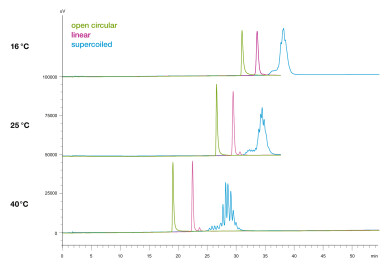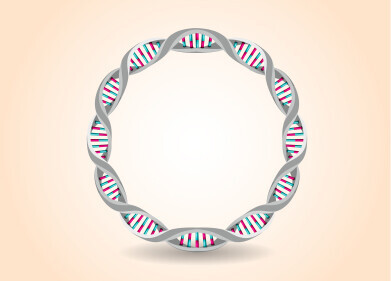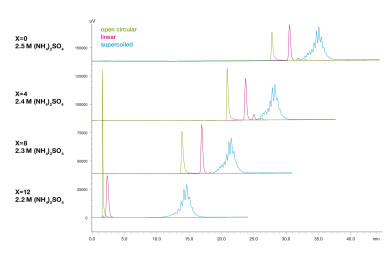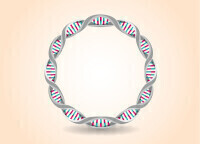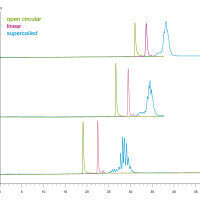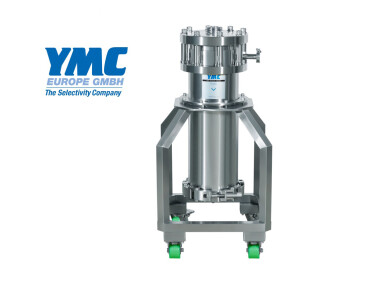Columns (LC)
Efficient HIC plasmid isoform analysis
Jun 25 2024
Artificial plasmid DNA (pDNA) can exist in different isoforms: open circular, linear and supercoiled. Hydrophobic interaction chromatography (HIC) is particularly suitable for separating these forms from each other.
This expert tip using YMC’s BioPro HIC BF column provides practical examples and important parameters for HIC method development. The following aspects are decisive for method development:
- Influence of salt concentration
- Optimum separation conditions for different buffer systems
- Influence of temperature
The influence of the initial salt concentration
The composition of the mobile phase significantly impacts HIC analysis, particularly the choice of salt and its concentration, which affect analyte binding. Ammonium sulphate is commonly used for its strong salting-out effect. With higher initial concentrations of ammonium sulphate the analyte is stronger retained, thereby directly influencing the analysis time.
In HIC, the added salt itself as well as its concentration, which have an effect on analyte binding, are decisive for the separation. To illustrate this, different concentrations of ammonium sulphate were used in this example. The gradient of the slope was adjusted accordingly in each case. Initially, a Tris-HCl buffer was used as mobile phase. However, with 2.2 M ammonium sulphate, the open circular and linear isoforms were not sufficiently retained. As a result, 2.3 M ammonium sulphate was identified as the optimal initial concentration, providing the shortest analysis time while ensuring sufficient analyte retention. Using phosphate buffer as mobile phase and an initial concentration of 2.3 M ammonium sulphate shortened the analysis time. All pDNA isoforms were well separated. In order to monitor the influence of other factors as closely as possible, a concentration of 2.5 M ammonium sulphate was used for further experiments.
Optimisation of the flow rate
Higher flow rates can reduce analysis time, so determining an optimal flow rate for both buffers is critical. When Tris-HCl buffer was used as mobile phase, increasing the flow rate resulted in increased peak tailing and inadequate separation of all isoforms. In contrast, using phosphate buffer, all pDNA isoforms were successfully separated at every flow rate tested. By increasing the flow rate to 1.0 mL/min, the analysis time was reduced by 50% to 17.5 minutes.
The influence of temperature on the separation of pDNA isoforms
Column temperature can significantly influence the analysis time and other parameters such as peak shape. This makes it a very valuable tool for optimizing the separation. For the analysis of pDNA, three temperatures were examined using phosphate buffer as mobile phase. Higher temperatures were accompanied with shorter analysis times and improved peak shapes. However, the analysis was not carried out with Tris-HCl buffer because its pH is highly sensitive to temperature changes.
Conclusions
With HIC, the choice of salt and its initial concentration are critical for analyte binding. A low concentration is required to achieve short analysis times. In combination with a higher flow rate, the analysis can also be further accelerated. A higher temperature also shortens the analysis time. However, it is important to note that the buffer stability may vary with the temperature.
Events
May 11 2025 Vienna, Austria
May 18 2025 Tempe. AZ, USA
May 21 2025 Birmingham, UK
Jun 01 2025 Baltimore, MD, USA
Jun 15 2025 Bruges, Belgium
